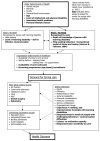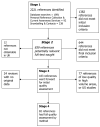Access to health care for people with learning disabilities in the UK: mapping the issues and reviewing the evidence
- PMID: 16053595
- PMCID: PMC2020839
- DOI: 10.1258/1355819054338997
Access to health care for people with learning disabilities in the UK: mapping the issues and reviewing the evidence
Abstract
Objectives: People with learning disabilities are more prone to a wide range of additional physical and mental health problems than the general population. Our aim was to map the issues and review the evidence on access to health care for these patients. The review sought to identify theory, evidence and gaps in knowledge relating to the help-seeking behaviour of people with learning disabilities and their carers, barriers and problems they experience accessing the full range of health services, and practical and effective interventions aiming to improve access to health care.
Methods: A three-strand approach was adopted, involving searches of electronic databases, a consultation exercise and a mail shot to researchers and learning disability health professionals. Evidence relevant to our model of 'access' was evaluated for scientific rigour and selected papers synthesized.
Results: Overall, a lack of rigorous research in this area was noted and significant gaps in the evidence base were apparent. Evidence was identified on the difficulties in identifying health needs among people with learning disabilities and the potentially empowering or obstructive influence of third parties on access to health care. Barriers to access identified within health services included problems with communication, inadequate facilities, rigid procedures and lack of appropriate interpersonal skills among mainstream health care professionals in caring for these patients. A number of innovations designed to improve access were identified, including a communication aid, a prompt card to support general practitioners, health check programmes and walk-in clinics.
Conclusion: There are important gaps in the knowledge base on access to health care for this group. While these need to be addressed, developing strategies to overcome identified barriers should be a priority, along with fuller evaluation of existing innovations.
Figures
References
-
- Foundation for People with Learning Disabilities . Learning Disabilities: The Fundamental Facts. London: The Mental Health Foundation; 2001.
-
- van Schrojenstein Lantman-de Valk HMJ, van den Akker M, Maaskant MA, Haveman MJ, Urlings HFJ, Kessels AGH, Crebolder HFJM. Prevalence and incidence of health problems in people with intellectual disability. Journal of Intellectual Disability Research. 1997;41:42–51. - PubMed
-
- Department of Health . The New NHS: Modern, Dependable. London: HMSO; 1997.
Publication types
MeSH terms
Grants and funding
LinkOut - more resources
Full Text Sources
Medical




